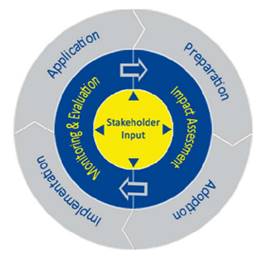International work
NNR has an active engagement in better regulation work both at the EU level and within the OECD. At the EU level, NNR sometimes acts independently, but often through BusinessEurope. NNR participates in BusinessEurope’s working group for better regulation on a mandate from the Confederation of Swedish Enterprise. In broader international contexts, NNR acts both independently and through BIAC’s (Business at OECD’s) Governance and Regulatory Policy Committee via a mandate from the Confederation of Swedish Enterprise. NNR thereby participates in meetings of the OECD’s Regulatory Policy Committee and provides comments on its work.
Better regulation efforts in the EU
The Commission is responsible for planning, preparing, and proposing new EU legislation and policies. These efforts are based on the Commission’s annual work program.
Impact assessments are to be prepared by the Commission for laws and secondary legislation (delegated and implementing acts) that may cause significant effects. The first step is usually a so-called – call for evidence (invitation to submit comments) for politically sensitive and/or important new laws or strategies, evaluations of existing laws and initiatives, or so-called fitness check of the effectiveness of a bundle of related existing laws and/or policies. Furthermore, it explains why an EU initiative is needed and outlines policy options and describes the main features of the consultation strategy, including whether a public consultation with a questionnaire is needed.
The Commission’s Regulatory Scrutiny Board is the body that reviews the quality of the Commission’s impact assessments, evaluations, and so-called fitness checks. The Commission’s impact assessments and the Board’s opinion on them are published online once the Commission has adopted the proposal.
During the regulatory process, the Commission often consults with relevant stakeholders. Guidelines and tools have been developed for these consultations. In addition to providing opportunities to submit comments at an early stage via so-called calls for evidence, the Commission holds public consultations. Even when a regulatory proposal has been decided upon and forwarded to Parliament and the Council, there is an opportunity to submit comments on the proposal.
The consultation opportunities are described on the Commission’s website ”Contribute to the legislative process”. The website ‘Contribute to law-making’, created by the Commission to collect comments on new and existing laws and initiatives can also be accessed there. The website ‘Have your say: Simplify!’, allows citizens and businesses to submit proposals for simplifying and modernizing EU legislation.
The EU’s evaluation system consists of systematic evaluations of individual rules combined with more comprehensive fitness checks of several related existing laws or policies. Legislative proposals often include a clause on follow-up of the regulations. The Commission also states in its guidelines for better regulation a principle of evaluating first before proposing new rules. Furthermore, starting with its work program in 2022, the Commission introduced a ”one in, one out” principle. This principle means that newly introduced burdens should be compensated by removing equivalent burdens within the same policy area.
The better regulation efforts are manifested in various parts of the EU decision-making process, which is shown in the following image:

Source: European Commission
More information about the Commission’s better regulation work and on simplifying EU regulations and reducing unnecessary regulatory costs are available here. Guidelines and tools for these efforts have been developed and are available here. The better regulation guidelines apply to all steps in the law-making process and set out the principles with which the European Commission should comply when preparing new initiatives and when managing and evaluating existing legislation.
An Interinstitutional agreement on better law-making (IIA) has been agreed by the European Commission, the European Parliament and the European Council regarding better regulation. According to the agreement, the European Council and the European Parliament will also make impact assessments of substantial amendments to the original proposal.
The European Parliamentary Research Service (EPRS) has an impact assessment unit that reviews the European Commission’s impact assessments and offers the European Parliament committees to make impact assessments of any substantial amendments to the European Commission’s proposals.
To date, no impact assessments have been carried out by the Coucil on proposals for significant amendments by the Council and very few by Parliament on proposals for significant amendments by Parliament on the initial proposal from the Commission.
NNR is striving to actively work to drive the development of the EU’s better regulation efforts and to contribute with concrete improvements to EU legislation and the processes surrounding it. NNR’s agenda for the EU’s work on better regulation presents NNR’s views on the EU’s better regulation work and provides suggestions on how this can be further improved.
NNR has also, together with its members, developed recommendations for an improved decision-making process regarding delegated acts and other secondary legislation.
Collection of simplification proposals that NNR has contributed to:
– NNR’s response to the Commission’s ”call for evidence” for reduced reporting burdens in November 2023 can be found here with attachment here.
– NNR’s members’ proposals for EU legislation with simplification potential submitted to the Government Offices at their request in February 2025.
– BusinessEurope’s 68 proposals for reduced regulatory burden at the EU level.
